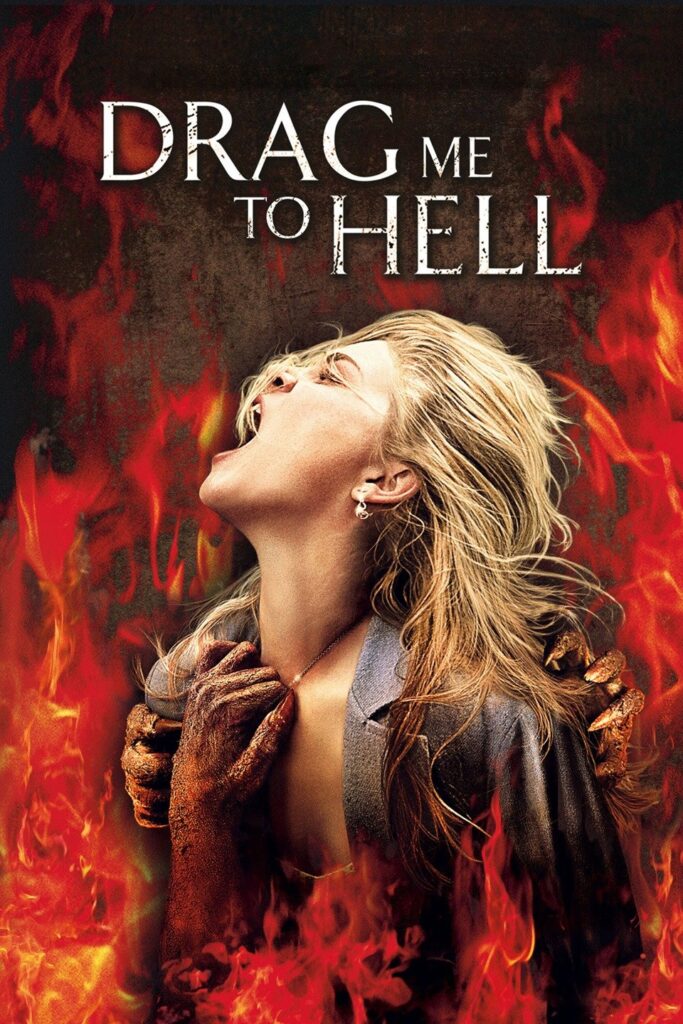The following is an excerpt from my book Christian Horror: On the Compatibility of a Biblical Worldview and the Horror Genre, from the section entitled Christian Horror Offers Redemption Amidst Darkness.
***
Much contemporary horror can be bleak and filled with despair. In fact, nihilism and hopelessness often occupy a significant swath of the horror canon, a trend that parallels the contemporary world’s spiritual climate. For instance, Time magazine recently reported, More Millennials Are Dying ‘Deaths of Despair,’ as Overdose and Suicide Rates Climb. This rise of anxiety and depression among young adults in the U.S. is unprecedented, leading Psychology Today to describe us as undergoing an “epidemic of hopelessness.”
Likewise, some contemporary horror reflects a growing hopelessness and despair in society.

Stories like Drag Me to Hell—where, despite tremendous resistance on the part of the protagonist, an old woman’s curse still damns the lead character to hell—often frame evil as omnipotent and irresistible. Like the ancestral curse featured in Ari Aster’s Hereditary which pulls a family (at least, what remains of it) to a bleak existential inevitability. In Frank Darabont’s The Mist (2007) suicide is portrayed as the characters’ only viable option. Then there’s the popular Netflix series Midnight Mass (2021) whose entire cast eventually vaporizes into ash, wafting into a godless cosmos, “returning to pure energy; all their memories but ‘fleeting little dreamlets imprinted upon the tissue of [a] dying brain.’”
Thomas Ligotti, a weird fiction author who won the Bram Stoker Award for Lifetime Achievement in 2019, is another horror author known for his pessimistic, nihilistic view on life. One author describes Ligotti’s method thus:
Whereas other horror writers often grapple with the primordial fear of death, Ligotti writes about the endless horror of life. His is a world of deep paranoia and pointlessness. Even his villains seem sad and pathetic, which they are as fellow sufferers of the world we all inhabit.
Elsewhere, Ligotti has described himself as an anti-natalist. Anti-natalism is the philosophical position that assigns a negative value to birth and views procreation as immoral. Because life entails inevitable suffering and ultimate death, and no one chooses to be born, the entire human race should stop reproducing and hasten its own extinction. Ligotti himself describes it this way:
Antinatalism is based on the principle that suffering of whatever kind or degree should not be caused or perpetuated, and that human existence necessarily entails suffering that we can neither escape nor justify, least of all by experiencing pleasures. Thus, the only way to end all suffering is to cease producing beings who suffer. — Thomas Ligotti, quoted in Nathaniel Katz, ‘Interview: Thomas Ligotti’ (2011), in Cardin (ed.), Born to Fear, pp. 185–97 (p. 191)
It goes without saying, but such a worldview is violently antithetical to Scripture. Of course, the Bible affirms the presence of suffering and evil. Unlike many Eastern religions, Christianity does not see suffering as illusory or part of some karmic cycle. Instead, Scripture describes suffering as the fallout of humanity’s rejection of God. Suffering is something we should both anticipate and attempt to alleviate. Christians are called to care for the sick and suffering. Which is one reason why the development of medicine and the creation of hospitals were both greatly influenced by Christianity.
Suffering is something we should both anticipate and attempt to alleviate.
In the larger scope, God ultimately promises to recreate the world. The last book of the Bible describes “a new heaven and a new earth” (Rev. 21:1) where God will wipe every tear from His peoples’ eyes. And “There will be no more death or mourning or crying or pain, for the old order of things has passed away” (vs. 4). This is why the apostle Paul famously said,
…the sufferings of this present time are not worthy to be compared with the glory which shall be revealed in us. (Rom. 8:18 KJV)
Of course, in this life evil sometimes wins. We must endure suffering on earth. However, this does not mean that life is meaningless or without hope. Yielding to despair and pessimism is counter to the promises of Christ. Jesus said, “In this world you will have trouble. But take heart! I have overcome the world” (Jn. 16:33). Christ’s Resurrection is the foundation for all Christian hope. Because He lives, we can live! (Jn. 14:19). His Resurrection assures ours.

Likewise, for the believer, even the bleakest of situations is not cause for despair. The early church experienced mass persecution and often unspeakable tortures. It led Tertullian, one of the Church Fathers, to coin the term, “the blood of martyrs is the seed of the Church.” Despite suffering and persecution, Christianity spread in unprecedented fashion. Furthermore, Scripture says that when temptation overtakes us, there is always a “way of escape” (I Cor. 10:13). During dark times, God does not leave us stranded. Even when tragedy strikes or trial leads to defeat, God promises to remain by our side. In the event of inevitable death, Christians still maintain the hope of glory. While some may view this as pie-in-sky optimism or frame such beliefs as trite positivism, Christian hope is a powerful and essential distinctive of the faith.
As David Taylor, Pastor of Arts at Hope Chapel in Austin, Texas, reminds us:
The horror story, in the end, is a reminder that our present reality is disturbed and distorted. In the hands of the Christian, that reminder can become an invitation to redemption. Leave behind your claims to self-sufficiency! Stop trying to manage your life! Quit calling good evil! Do not be afraid of death! The horror story is not an escape from life, in all its wildness and terrible beauty; it is rather a way of walking through it, and as such a reminder that there is meaning, thanks be to God, in the middle of all the horror.
One of the common arguments against the horror genre is that dark subject matter will inevitably affect the human psyche. The individual who consumes such content may become spiritually and emotionally disquieted, disturbed, or fearful. This is inarguably true. Anyone who’s ever watched a horror movie knows the feeling of becoming troubled or uneasy. This could mean that the filmmaker has done their job! But it could also mean that the messaging of the piece is unbiblical or erroneous.
Christian horror is unique in that it occurs in a redemptive context. Or as Taylor put it, “there is meaning… in the middle of all the horror.” Of course, this doesn’t mean that every story should have a happy ending. Nor does it mean portrayals of evil should be tempered or softened. It means that Hope and Goodness should always be lurking within our tales. Even amidst the darkness, there should be a “way of escape.” Even in “the valley of the shadow of death” (Ps. 23:4), God is with us. Though evil prevails, justice is inevitable.














Have you critiqued the philosophical pessimism in “True Detective” season 1. If not, I’m curious what your thoughts might be
Great question. True Detective Season One remains one of my all-time favorite stories. Nic Pizzolatto, the producer and writer, admits to being influenced by Ligotti, and nihilistic philosophy in general. However, what turned the “tone” of the story from bleak nihilism to something hopeful or morally favorable was Rust Cohle’s (played by Matthew McConaughey) narrative arc. Throughout the series, Cohle was the mouthpiece for existential despair. Until a near-death experience in the final episode. He recalls an encounter with something vast and ethereal, where his deceased daughter and father waited for him. It was so much more than the eternal nothingness he’d previously espoused. In fact, Cohle’s final statement was, “Once there was only dark. If you ask me, light is winning.” It was an incredible philosophical about-face, one that some viewers loathed. Nevertheless, I felt it provided a much-needed balance to the bleak, existential worldview he’d espoused the entire story.
Christian horror is the only kind I can handle